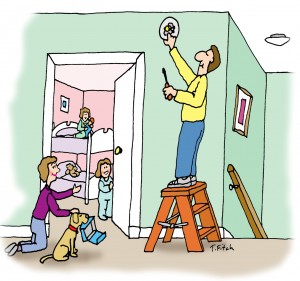What You Need To Know When Selling
It is quite possible that MN Stat. 299.51 snuck up on you and your clients like carbon monoxide – silently. Although this new state mandate had received some attention during the legislative session, word of the new law (effective August 1, 2008 for existing single-family homes) and its application has not spread throughout the industry.
What is it? The new carbon monoxide (CO) alarm law requires that “every single-family dwelling and every dwelling unit in a multifamily dwelling” have “an approved and operational  carbon monoxide alarm installed within ten feet of each room lawfully used for sleeping purposes.” This law was effective as of August 1, 2007 for newly constructed homes, and just became effective August 1, 2008 for all existing single-family dwelling units. It becomes effective in August 1, 2009 for existing multifamily dwelling units. The alarms must be an approved device (conforming to UL2034 standards), and may be hardwired, plugged in, or battery-powered (if attached to the wall).
carbon monoxide alarm installed within ten feet of each room lawfully used for sleeping purposes.” This law was effective as of August 1, 2007 for newly constructed homes, and just became effective August 1, 2008 for all existing single-family dwelling units. It becomes effective in August 1, 2009 for existing multifamily dwelling units. The alarms must be an approved device (conforming to UL2034 standards), and may be hardwired, plugged in, or battery-powered (if attached to the wall).
What does it mean to you? Ultimately, as a REALTOR® or home seller you should be familiar with this law for several reasons. First, it’s a reminder of the importance of carbon monoxide alarms – the issue has been determined significant enough that homes are now mandated to have them, by state law. Consequently, you may want to ensure you and your family are protected by having them in your own home.
Second, it’s important for you as a buyer’s agent to bring this issue to the attention of buyers, and be sure that the home the buyer ultimately purchases is properly equipped with these detectors, provided by the seller. Finally, as a listing agent, it is important to review this requirement with your seller client; to be sure he or she recognizes they have a direct legal obligation to equip the home with these alarms.
Listing agents should verify that the seller is complying with this law before listing or selling the property.
An additional problem arises for both the seller and for you as a listing agent, if this requirement is not met. While damages for failure to comply are not specifically articulated by the statute, it is certainly foreseeable that actual damages could be extraordinary in the event the seller fails to install the alarms and an unwitting buyer is injured or killed due to undetected carbon monoxide poisoning which may have been prevented with a proper alarm.
Some sellers may think they can rely on simply disclosing the lack of having the required alarms in lieu of installing the alarms, in an attempt to avoid responsibility for the cost of adding the alarms. Failure to have alarms installed and relying upon disclosure alone is an unwise course of action for sellers and agents, due to the potential damages described above.
What should be done? For all of your listings, with buyers you represent, and agents you work with in your office, be sure that everyone is informed of this new legal obligation. Take proactive steps to be sure that sellers have these detectors/alarms installed, and perhaps get in touch with vendors or individuals who supply or install these alarms so you have resources available for your client, in the event they want to know where they can obtain these, and what the costs may be.
More information about this or selling your home please call Derrick Monroe at 612-282-7653.
